- Home
- Bonnie Bryant
Horse Trade Page 5
Horse Trade Read online
Page 5
After class, when the horses had been unsaddled and groomed, The Saddle Club met in the tack room. Hollie was already there, sitting on a pile of horse blankets, looking glumly at the tangles of tack on the opposite wall.
“I don’t know if horseback riding is for me,” she said to Lisa. “No applause. No makeup. No audience. I think maybe I’m too much of a lightweight to be a serious rider.”
“Hey,” Lisa said, flopping down next to her. “Were you a star after your first acting lesson?”
“No.” Hollie had a wry expression. “I’m certainly not a star now either.”
“It’s not so different from learning to act,” Lisa insisted. “You have to master technique, study the greats, and tune your instrument.”
“I didn’t know you played an instrument,” Stevie said, popping open a soda can.
“An actor’s body is her instrument,” Lisa said. “She has to keep it fit and well tuned.”
“Same thing with dressage,” Stevie said, and took a sip of her soda. “Horses are basically kind of stiff and bulky. Dressage makes them supple and graceful.”
“It’s like a strengthen-and-stretch class,” Lisa said. “Plus it’s like aerobics. Plus it’s like a total body workout.”
“And a total mind workout,” Carole said. “The heart of dressage is rider-horse communication. It has to be based on a set of shared signals, which can be anything from the pressure of a knee to a slight change in the balance of the rider.”
Lisa could see that Carole was getting overly serious and that Hollie was losing interest again.
“It’s like dancing,” Stevie said suddenly. “That’s what it’s really like. When things are going right, you and the horse don’t even have to communicate with each other—you just know.”
“I know what you mean,” Hollie said, sitting up straight. “When you’re performing, you have to forget about everything you’ve learned and dance the music. You have to dance it like you’re hearing it for the first time, as if you don’t know what note comes next.”
“That’s it!” As Stevie jumped up, her soda sloshed on her knee, making a dark spot on her breeches. “I was telling Phil that we needed to add something extra to the dressage exhibition, something with music.” She looked at Hollie excitedly. “You could help us. You could be our choreographer.”
“Me?” Hollie said, looking somewhat stunned at this new idea.
“You helped with the dance numbers in Annie,” Stevie said. “You told Lisa that blocking them out was your favorite part.”
“Horses can’t dance,” Hollie said, crossing her arms. “I know they’re wonderful and fascinating and stuff, but they can’t exactly dance.”
“That’s what you think,” said Stevie.
Carole and Lisa sat grinning at Stevie. Now Lisa shook her head. “You and Phil are going to dance with your horses in Cross County’s exhibition?”
Stevie flushed. “It sounds a little silly, but I thought it would be fun.”
“I think it’s a great idea,” Carole chimed in. “Very Stevian.”
“Thanks, Carole,” Stevie remarked.
“What makes you think it was a compliment?” Carole teased her. Then she glanced suddenly at her watch. “Whoops. I’d better go. I promised my dad I’d go to something at the base.” Carole’s father was a colonel in the Marine Corps, stationed at Quantico, and sometimes Carole went with him to functions at the base. Carole’s mother had died a few years ago, and she and her father were very close.
“I have to go, too,” Lisa said, standing up. “I have this paper due in three weeks and I haven’t even started the research.”
“Three weeks!” Stevie said. “Are you bonkers? It’s too soon to even think about the paper.”
But Lisa was heading for the door.
“I guess it’s just you and me,” Stevie said to Hollie with a grin. “So are you up to being our choreographer?”
“Sure,” Hollie answered.
“Okay, stand up.” When Hollie looked surprised, Stevie explained that they might as well be comfortable. She dragged the pile of horse blankets into a corner, where she rolled up two and propped them against the wall as backrests. Then she went into Mrs. Reg’s office next door and borrowed a sheet of paper and a pencil.
“Okay,” she said, flopping down next to Hollie, “how do we go about this?”
Hollie leaned back and closed her eyes. “The main thing is that you have to have a deam,” she said.
“Sure,” Stevie said. “I knew that. How do you spell ‘deam’?”
“What?” Hollie said, looking surprised.
“Deam. Is it ‘deem’ with two e’s?”
“Not deam … deam,” Hollie said.
Stevie was beginning to feel totally confused.
Hollie sneezed loudly, then said, “I mean ‘deam.’ ” She spelled it out. “T-H-E-M-E.”
“Oh, theme,” Stevie said, writing it down. “Good idea. What could it be?”
Hollie sniffed and said, “You look at what your deatrical assets are.”
“Hunh?” Stevie said.
“What’s best about the dancers, horses, whatever. And you play on that,” Hollie said. “Like the dicest thing about you and Phil is that you’re a douple.”
“Couple?” Stevie asked.
“That’s it,” Hollie said. “You really like each other. And this will show up in your dancing. Do your dorses like each other?”
“Horses?”
Hollie nodded.
“You know, they do,” Stevie said. “I hadn’t really focused on it, but they do. I guess they pick it up from us.”
“No doubt,” Hollie said with a dreamy look in her eyes. “So I’m dinking about some kind of classic duet. The dorses will give it a dwist. You have do have a dwist,” she said meditatively. “You’re nowhere without a dwist. I know!” She was so excited she half jumped off the horse blankets. “That’s it. Indedible!” And then she sneezed not once, but twice.
“Listen,” Stevie said, looking at her with concern, “you’re getting sick. Do you think you should go home?”
“Dever,” Hollie said. “I’m dabsolutely fine.”
But Stevie stood up and started to pull Hollie to her feet. “You need to do something about that cold of yours.”
“It’s nothing,” Hollie was saying. “It’s dodally dover.”
“Are you sure?” Stevie said doubtfully. “You sound horrible.”
Hollie nodded emphatically, then gestured for Stevie to sit back down again. “I’ve got a great idea,” she began.“You know that song ‘Always’? Well, you and Phil could …”
Stevie obediently dropped back down on the blanket and listened to Hollie. Soon she was so absorbed in Hollie’s ideas for the dressage exhibition, she forgot all about the other girl’s cold.
THE NEXT DAY, Phil was sitting on the bench in front of the Berryville pharmacy when Stevie got off the bus.
“I’ve solved everything,” she said while she was still halfway down the steps of the bus. “I’ve got our doncept.”
“Doncept?” Phil said as her feet hit the dusty road.
“Oops. I’ve been talking to Hollie too long. I mean concept. The concept is the whole thing,” Stevie told him. “Without a concept we’re dead.”
“For real?” Phil said as they turned up the road that led toward his place. Far off, in front of the forest, Stevie could see the red brick chimney and gray stones of his house.
“Hollie came up with this absolutely killer concept. It’s a song called ‘Almost.’ ”
“Almost what?” Phil said.
“Almost ‘Almost.’ I mean the name of the song is ‘Almost.’ Hollie and I wrote the words. It’s about two people who like each other and intend to get together, but something gets in their way.”
Phil looked at her blankly.
“What I mean is,” Stevie went on, rushing to explain the wonderful idea to Phil, “you and I will countercanter toward each other and meet … almost. As
we do our figure eights, we’ll come closer and closer and join hands … almost. It’s sung to the tune of ‘Always.’ ”
“I don’t know if I like the sound of this,” Phil said grimly. “Miss after miss after miss sounds kind of depressing.”
“But at the end …” Stevie turned to him and grinned.
“Yes?” said Phil, looking really interested.
“We come together for a big finale and the song changes to ‘Always.’ This was Hollie’s idea,” Stevie added hastily.
“I like the way her mind works,” Phil said. They walked for a while in silence; then Phil said, “To tell you the truth, it makes me kind of nervous. Dressage and music,and riding with you. I’m wondering if Teddy and I are up to it. We aren’t as experienced as you.”
“So we’ll practice,” Stevie said happily. “I think this routine needs lots and lots of practice. Besides, it’s obvious No-Name has had some dressage experience, but she may need lots of work, too.”
“Okay,” Phil agreed.
When Stevie entered No-Name’s stall, she was afraid to look. On Friday she had doused the horse with fly spray. Today, if No-Name had hives, there would be no riding. Stevie half closed her eyes and ran her hand up No-Name’s neck, relieved to find that it felt smooth.
“You’re okay, you’re okay,” she murmured, opening her eyes. “Hey,” she said in No-Name’s ear, “you’re not allergic to whatever is in fly spray. So the culprit must be carrots, apples, or saddle soap.”
No-Name nuzzled Stevie, looking at her with her big brown eyes.
“Ready for ‘Almost’?” Stevie said.
No-Name nickered.
“Me too,” Stevie said. “Almost.”
When No-Name was saddled, Stevie led her into the outdoor ring, where she found Phil and Teddy doing elegant serpentines. After she had mounted, Stevie sat on No-Name watching them.
Phil rode up to her and grinned. “I’m almost ready.”
“Good attitude,” Stevie said.
“The only thing is that if we’re going to practice, we need the music,” Phil said.
“That’s okay,” Stevie said. “I’ll sing.”
Phil raised his eyebrows, “I can hardly wait.”
“Let’s warm up the horses with a sitting trot and then go into a shoulder-in.”
“You like to start at the top,” Phil grumbled. “Teddy and I always have trouble with the shoulder-in.”
“With me singing you can’t miss,” Stevie said cheerfully.
They walked their horses briskly around the ring to warm up their muscles, and then Stevie turned No-Name, and they trotted in opposite directions with Stevie singing.
“You belong to me … almost.
With a love that’s free … almost.”
Listening to herself, Stevie decided that she’d never fully appreciated her talents. She had lots of volume and expression. Next time there was a musical at the Willow Creek Community Theater, she was definitely going to try out. She could probably get a part in the chorus. Who knew? She might even be chosen to be the star.
As she and Phil rode toward each other, Stevie said, “Reverse directions and shoulder-in.” She noticed that Phil looked kind of odd, but she figured that must be because he was worried about the shoulder-in.
Doing the shoulder-in and the singing at the same time wasn’t exactly easy, Stevie realized. She had to get through to No-Name that she shouldn’t move just her head to the right, but her shoulder as well. If No-Name bent only her neck, she could acquire a rubber neck. Or she could throw her hind legs out so her body would be straight and there would be no shoulder curve.
Stevie pulled back gently on the right rein, but then with her right leg at the girth, she pushed No-Name forward so that her head and shoulder were moving right while her body moved forward. An average, untrained horse would fight it, but No-Name understood. Her head and right hock moved gracefully to the right while her body continued forward. She was like a ballet dancer in motion. Stevie wondered where No-Name had learned so much.
“Hey, look,” came Phil’s voice from the other side of the ring. Stevie looked over and saw that Teddy was doing great, switching smoothly from one side to the other.
Obviously, it was because of her singing, so Stevie sang louder. “ ‘You belong to me … almost.’ ”
A door slammed and a woman rushed to the side of the ring. “Hi, Mrs. Marsten,” Stevie called.
“Hi, Stevie,” said Mrs. Marsten, patting her chest as if she were alarmed by something. “Are you all right, dear?”
“Absolutely fine,” Stevie said.
“I heard the most terrible sound,” Mrs. Marsten explained. “Like a creature howling in pain. I was worried that something had happened.”
Stevie noticed that Phil’s face had turned red. He turned away.
“We’re fine.” Stevie shrugged. “We’re just practicing for the dressage exhibition.”
“But that sound,” Mrs. Marsten went on. “Whatever could it have been?”
A muffled noise burst out of Phil. Soon he was laughing so hard, he could barely talk.
“It’s okay, Mom,” he managed. “It was just … our sound effects.”
“They’re awfully …” Mrs. Marsten’s words trailed off. “Do you think they’re right for the exhibition?”
“We’ll work on it, Mom,” said Phil, now solemn-faced.
Stevie’s own face was beet-red. She’d never been so embarrassed in her entire life.
After Mrs. Marsten disappeared into the house, she glared at Phil.
“Very funny!”
“Hey, I didn’t tell her to say that,” Phil said, but then he choked on a laugh and started coughing.
Stevie drew herself tall in the saddle and said, “You’ll be glad to know that at the exhibition Lisa will be doing the singing. And Lisa has a great voice. She recently starred in Annie.”
“I know,” Phil said. “My whole family saw her and we thought she was fantastic.”
“I guess I’m no Lisa,” Stevie said grimly. “Maybe I’ll be a horse-show clown. Like one of those guys in baggy pants. I seem to have a certain natural talent.”
“A talent for riding, yes, for singing, no,” Phil said, trotting over to her with an amused look on his face.
“Phil,” came a voice from the house.
Stevie saw Mrs. Marsten’s head sticking out of an upper window. “Mr. Baker called,” she said, “and he wants you and Stevie to come early to the Pony Club meeting so he can check out your progress.”
“No problem,” Phil said, and made a thumbs-up gesture to show that everything was fine. He turned to Stevie. “We’d better groom the horses and get started.”
“Definitely,” Stevie said, thinking that now would be the time to try another possible allergy causer on No-Name. Today she had decided to try saddle soap.
After she’d picked No-Name’s hooves, a job that Stevie liked particularly because it took gentleness and concentration, and after she had brushed and curry-combed her, Stevie went into the Marstens’ tack room to polish No-Name’s saddle. She put it on the saddle horse, which was a saw horse topped by a V-shaped piece of wood, and stripped the saddle, removing the girth, stirrup leathers, and irons. Then she turned the saddle over and removed the dirt and dried sweat from the lining.
She put the saddle back on the saddle horse, washed it with cold water, and dried it with a soft chamois cloth, being careful to remove all the black greasy marks that were called jockeys. Then with an almost dry sponge, using a circular motion, she put saddle soap on the seat and the flaps. From experience Stevie knew to leave neither streaks nor crumbs, but this time she used way too much soap, the way a beginner would, and left a rim of yellow soap around the edge of the stirrup flaps.
“Hey, you missed some,” said Phil from behind her.
“I’m checking to see if she’s allergic to saddle soap,” she said.
“Good thinking,” said Phil. “That might well be it.”
W
hen they got to Cross County, Mr. Baker was in the ring, practicing shoulder-ins. It was funny, Stevie thought, to see a teacher practicing. But she knew that an important part of teaching was demonstrating. Stevie sighed, thinking of some of Max’s really great demonstrations, like the one he did on Prancer before the dressage rally a few weeks ago. To give good demonstrations, both horse and rider have to be in top shape. Mr. Baker and his horse were not just practicing their moves, but keeping limber.
“Stevie!” Mr. Baker said, touching his crop to his riding hat. “I’m glad you’ll be joining the exhibition. Cross County riders can learn a lot from you.”
Stevie smiled her thanks. “I’m sure I can learn a lot from them.”
“In any case,” said Mr. Baker with a smile, “I’d like to see Phil go through his paces alone first.” He turned to Phil. “I know you’ve been working, but I have to make sure that Cross County puts on a good show in front of the members of Horse Wise. We have our honor to uphold, after all.”
Stevie knew what he meant. Mr. Baker and Max Regnery were friends, but also rivals. Mr. Baker wanted to look good on his home turf.
“I’ll get out of the way,” Stevie said, and rode No-Name outside the ring, where she dismounted and let the horse graze on a patch of greenery next to the fence.
Phil started his dressage exercise with a sitting trot and moved into a shoulder-in and then a countercanter, making the changes with ease. He held the reins lightly while Teddy moved with his head up, feet bright, and tail lively.
“I’m impressed,” Mr. Baker said when Phil was finished. “You’ve gained finesse.” He turned to Stevie. “I think you have something to do with that.”
Stevie flushed with pleasure at the compliment. “Maybe,” she said, “but Phil’s been working hard on his own, too.”
“What will your performance consist of?” Mr. Baker asked.
“It’s a dressage duet to a song called ‘Almost,’ ” Phil said.
“Which is sung to the tune of the song ‘Always,’ ” Stevie added.
“Is that what that tune was?” Phil asked with a smile.
Stevie ignored him. “We’ll almost meet over and over again, and then at the end we will meet, and the song will change to ‘Always.’ ”

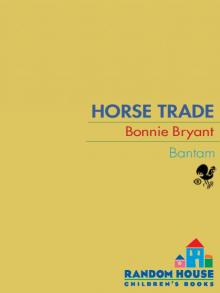 Horse Trade
Horse Trade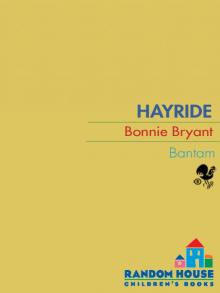 Hayride
Hayride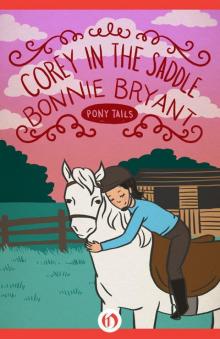 Pony Tails 06- Corey in the Saddle
Pony Tails 06- Corey in the Saddle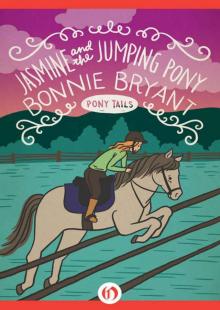 Jasmine and the Jumping Pony (Pony Tails Book 16)
Jasmine and the Jumping Pony (Pony Tails Book 16)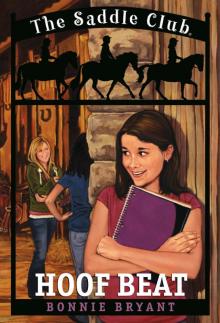 Hoof Beat
Hoof Beat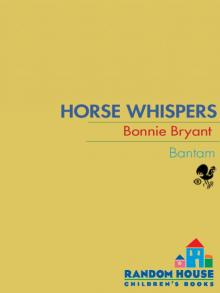 Horse Whispers
Horse Whispers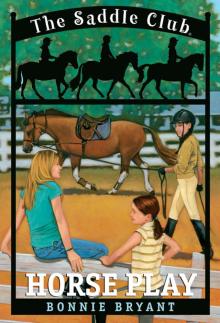 Horse Play
Horse Play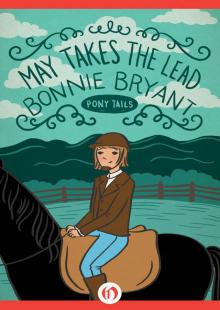 Pony Tails 05- May Takes the Lead
Pony Tails 05- May Takes the Lead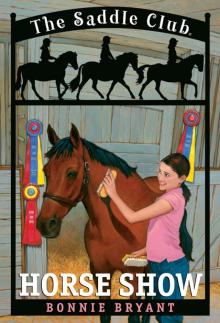 Horse Show
Horse Show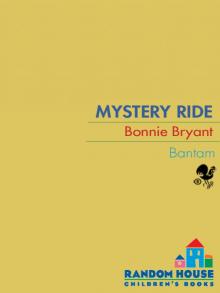 Mystery Ride
Mystery Ride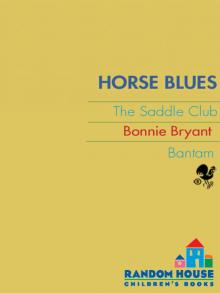 Horse Blues
Horse Blues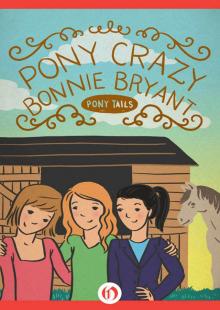 Pony Tails 01- Pony Crazy
Pony Tails 01- Pony Crazy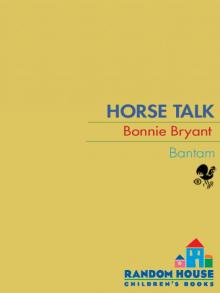 Horse Talk
Horse Talk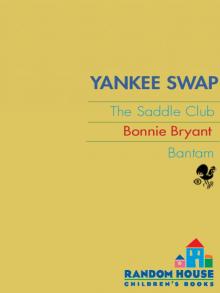 Yankee Swap
Yankee Swap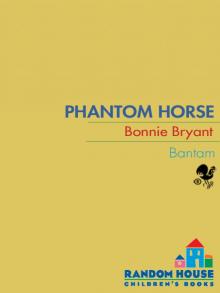 Phantom Horse
Phantom Horse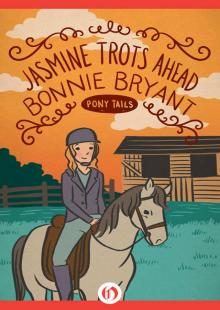 Pony Tails 07- Jasmine Trots Ahead
Pony Tails 07- Jasmine Trots Ahead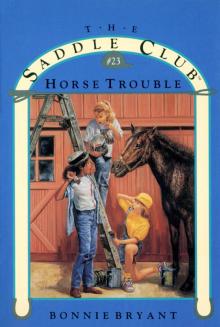 Horse Trouble
Horse Trouble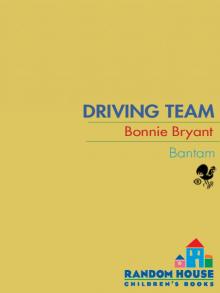 Driving Team
Driving Team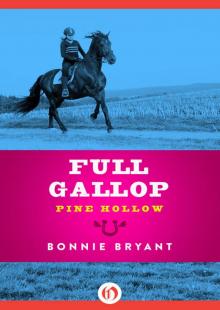 Full Gallop
Full Gallop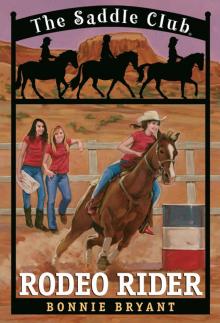 Rodeo Rider
Rodeo Rider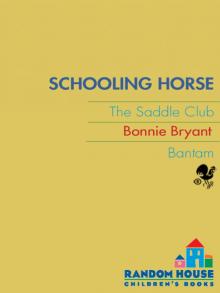 Schooling Horse
Schooling Horse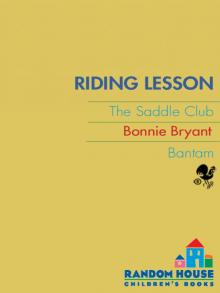 Riding Lesson
Riding Lesson Million-Dollar Horse
Million-Dollar Horse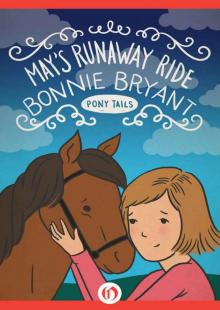 May's Runaway Ride (Pony Tails Book 14)
May's Runaway Ride (Pony Tails Book 14)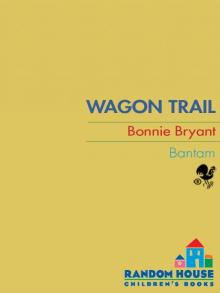 Wagon Trail
Wagon Trail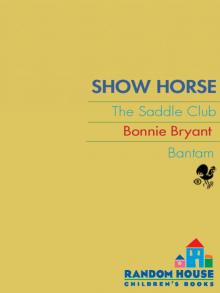 Show Horse
Show Horse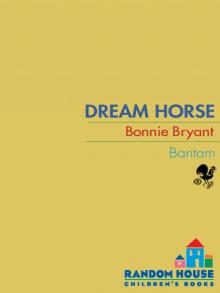 Dream Horse
Dream Horse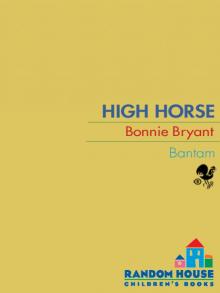 High Horse
High Horse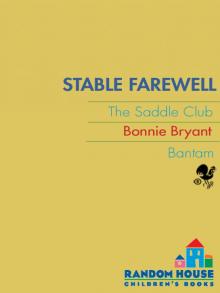 Stable Farewell
Stable Farewell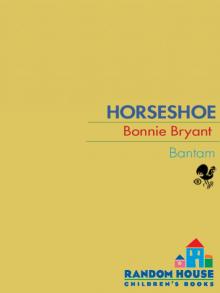 Horseshoe
Horseshoe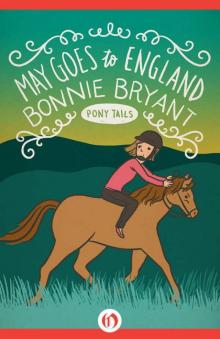 May Goes to England (Pony Tails Book 11)
May Goes to England (Pony Tails Book 11)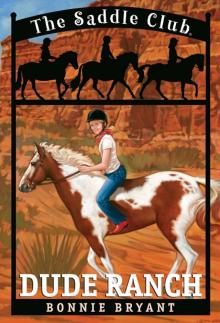 Dude Ranch
Dude Ranch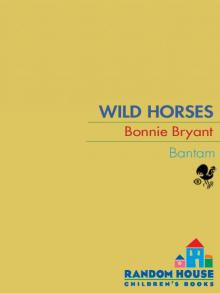 Wild Horse
Wild Horse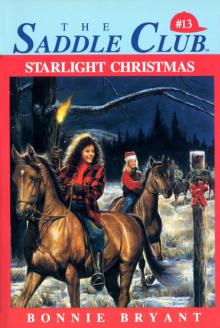 Starlight Christmas
Starlight Christmas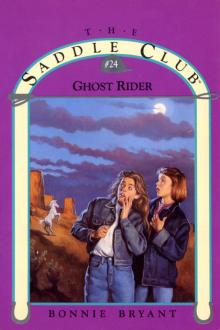 Ghost Rider
Ghost Rider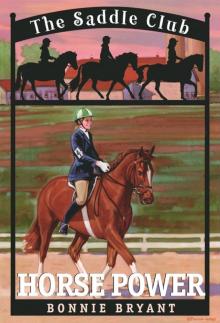 Horse Power
Horse Power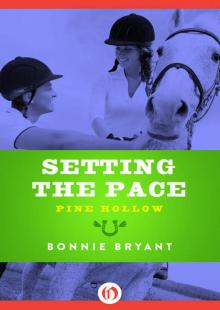 Setting the Pace
Setting the Pace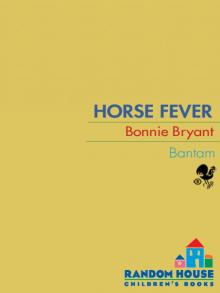 Horse Fever
Horse Fever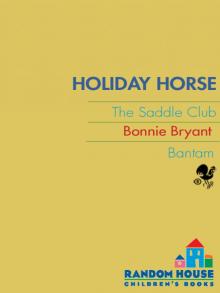 Holiday Horse
Holiday Horse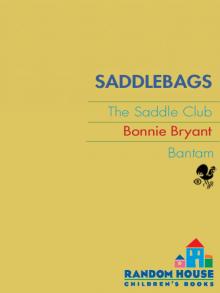 Saddlebags
Saddlebags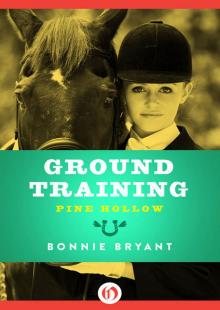 Ground Training
Ground Training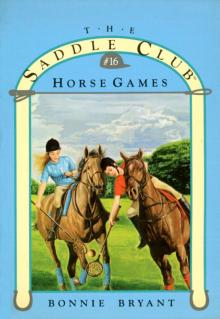 Horse Games
Horse Games Endurance Ride
Endurance Ride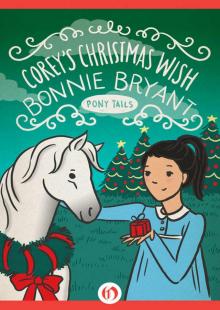 Pony Tails 15- Corey's Christmas Wish
Pony Tails 15- Corey's Christmas Wish Christmas Treasure
Christmas Treasure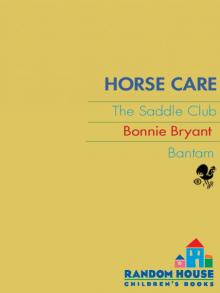 Horse Care
Horse Care Stagecoach
Stagecoach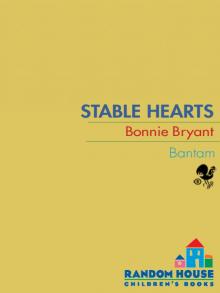 Stable Hearts
Stable Hearts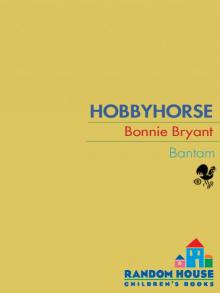 Hobbyhorse
Hobbyhorse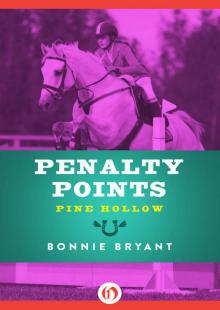 Penalty Points
Penalty Points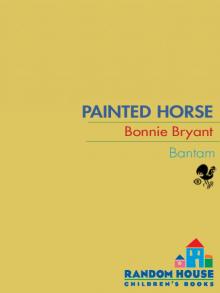 The Painted Horse
The Painted Horse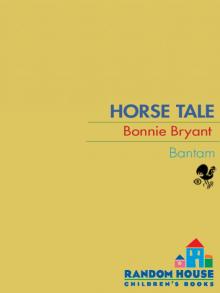 Horse Tale
Horse Tale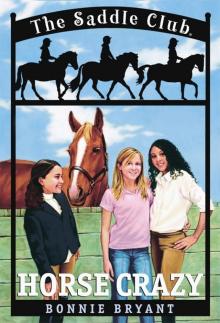 Horse Crazy
Horse Crazy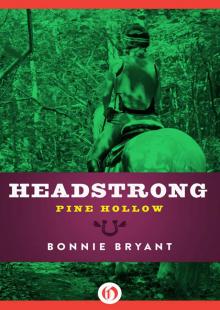 Headstrong
Headstrong English Rider
English Rider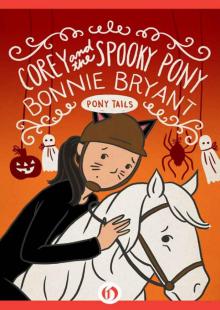 Corey and the Spooky Pony (Pony Tails Book 9)
Corey and the Spooky Pony (Pony Tails Book 9)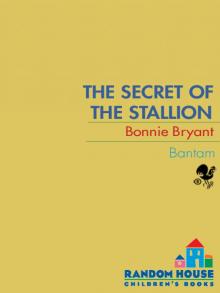 Secret of the Stallion
Secret of the Stallion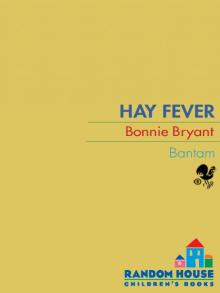 Hay Fever
Hay Fever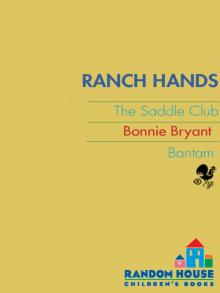 Ranch Hands
Ranch Hands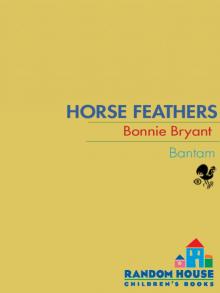 Horse Feathers
Horse Feathers Western Star
Western Star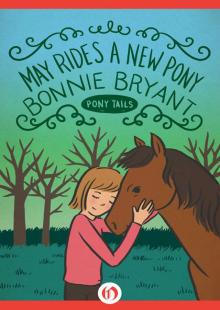 Pony Tails 08- May Rides a New Pony
Pony Tails 08- May Rides a New Pony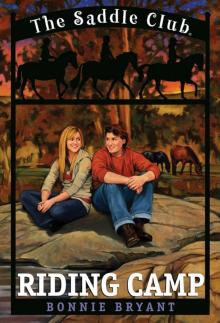 Riding Camp
Riding Camp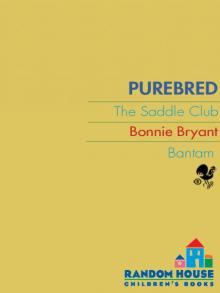 Purebred
Purebred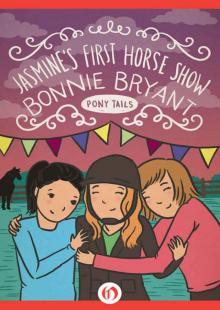 Jasmine's First Horse Show (Pony Tails Book 13)
Jasmine's First Horse Show (Pony Tails Book 13)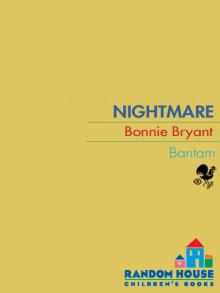 Nightmare
Nightmare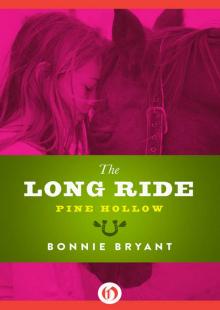 The Long Ride
The Long Ride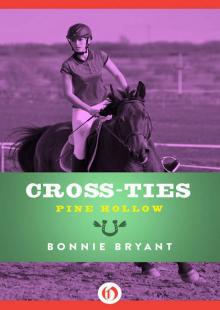 Cross-Ties
Cross-Ties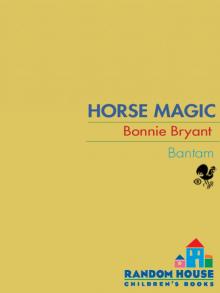 Horse Magic
Horse Magic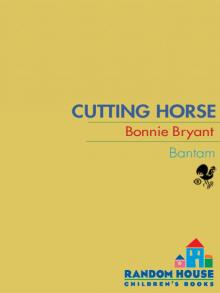 Cutting Horse
Cutting Horse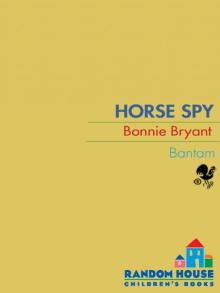 Horse Spy
Horse Spy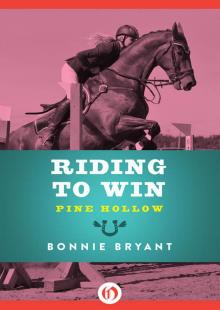 Riding to Win
Riding to Win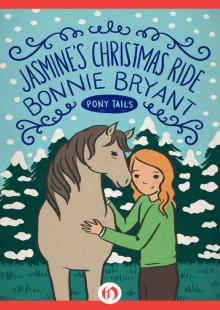 Pony Tails 04- Jasmine's Christmas Ride
Pony Tails 04- Jasmine's Christmas Ride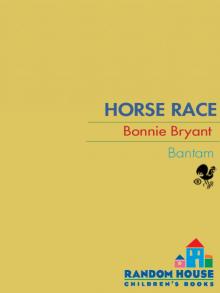 Horse Race
Horse Race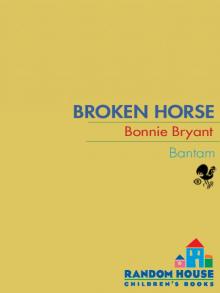 Broken Horse
Broken Horse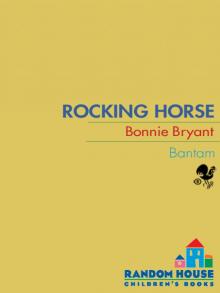 Rocking Horse
Rocking Horse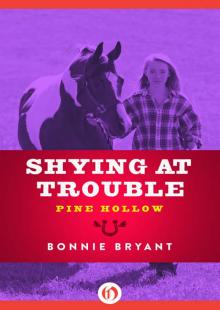 Shying at Trouble
Shying at Trouble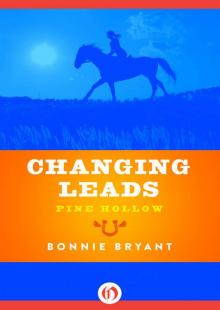 Changing Leads
Changing Leads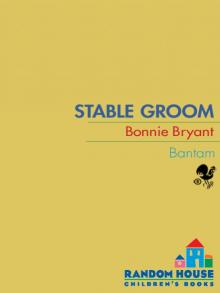 Stable Groom
Stable Groom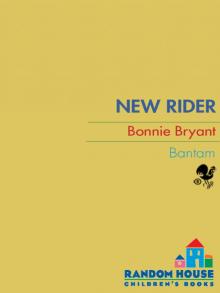 New Rider
New Rider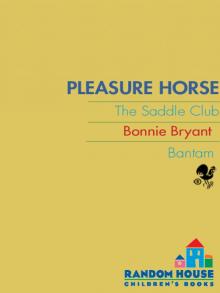 Pleasure Horse
Pleasure Horse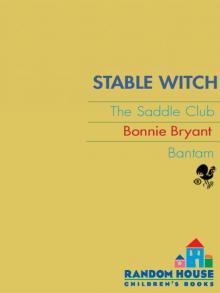 Stable Witch
Stable Witch Hard Hat
Hard Hat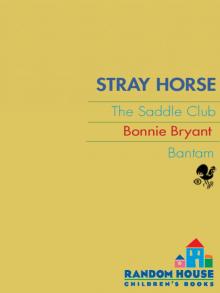 Stray Horse
Stray Horse High Stakes
High Stakes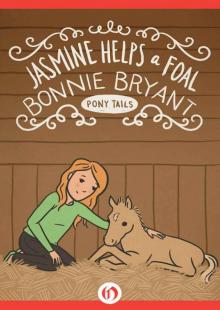 Jasmine Helps a Foal (Pony Tails Book 10)
Jasmine Helps a Foal (Pony Tails Book 10) English Horse
English Horse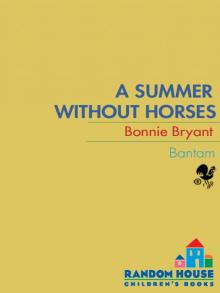 A Summer Without Horses
A Summer Without Horses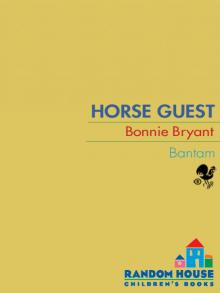 Horse Guest
Horse Guest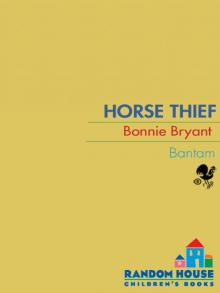 Horse Thief
Horse Thief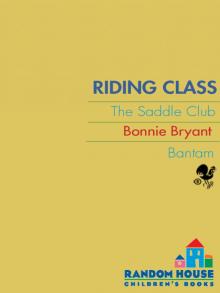 Riding Class
Riding Class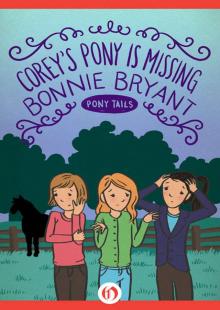 Pony Tails 03- Corey's Pony Is Missing
Pony Tails 03- Corey's Pony Is Missing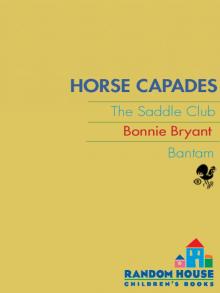 Horse Capades
Horse Capades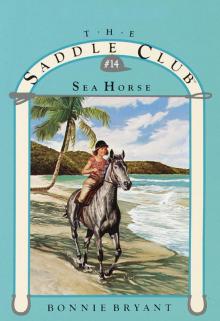 Sea Horse
Sea Horse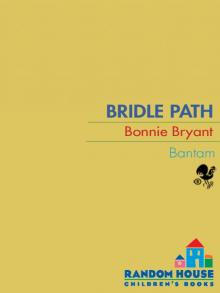 Bridle Path
Bridle Path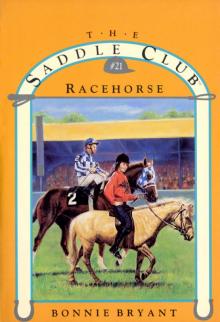 Racehorse
Racehorse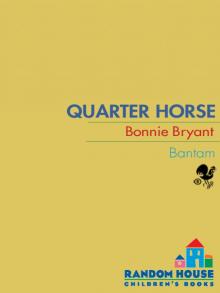 Quarter Horse
Quarter Horse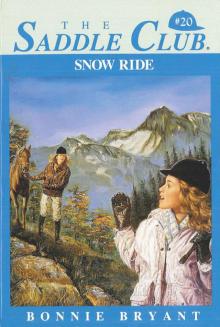 Snow Ride
Snow Ride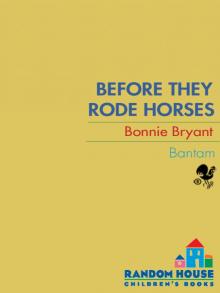 Before They Rode Horses
Before They Rode Horses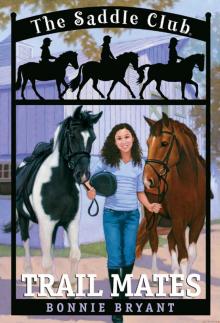 Trail Mates
Trail Mates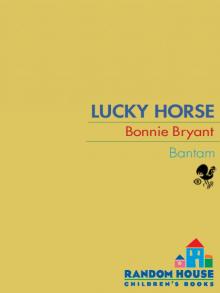 Lucky Horse
Lucky Horse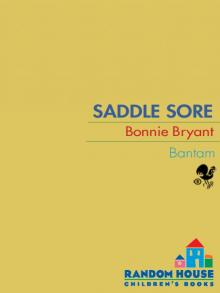 Saddle Sore
Saddle Sore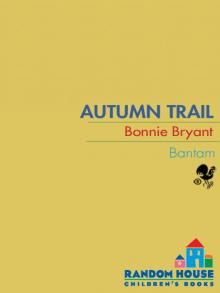 Autumn Trail
Autumn Trail Lisa
Lisa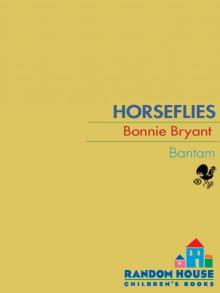 Horseflies
Horseflies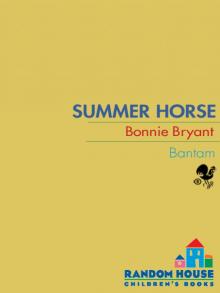 Summer Horse
Summer Horse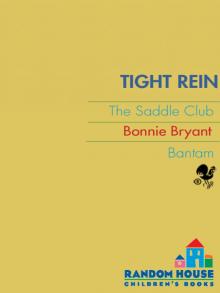 Tight Rein
Tight Rein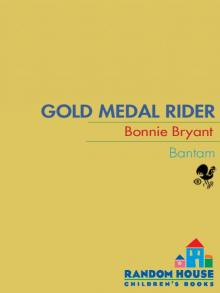 Gold Medal Rider
Gold Medal Rider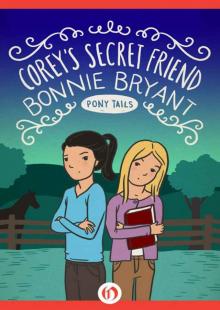 Corey's Secret Friend (Pony Tails Book 12)
Corey's Secret Friend (Pony Tails Book 12)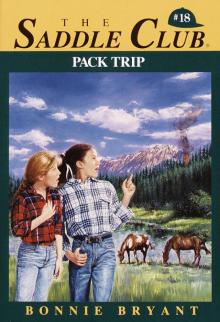 Pack Trip
Pack Trip Chocolate Horse
Chocolate Horse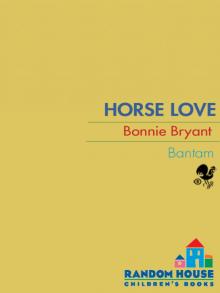 Horse Love
Horse Love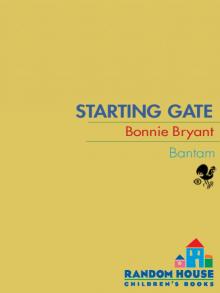 Starting Gate
Starting Gate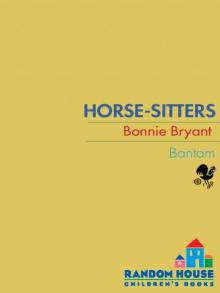 Horse-Sitters
Horse-Sitters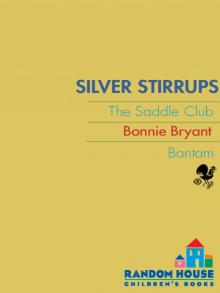 Silver Stirrups
Silver Stirrups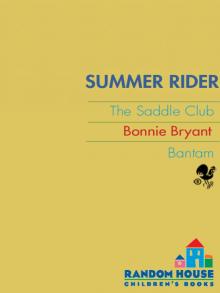 Summer Rider
Summer Rider Beach Ride
Beach Ride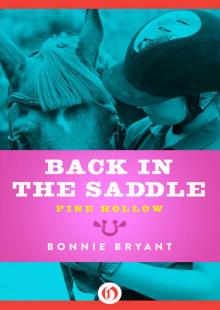 Back in the Saddle
Back in the Saddle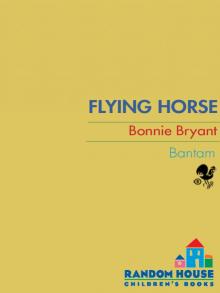 Flying Horse
Flying Horse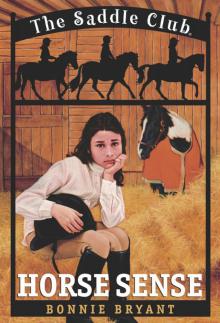 Horse Sense
Horse Sense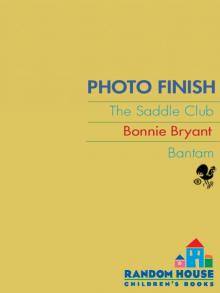 Photo Finish
Photo Finish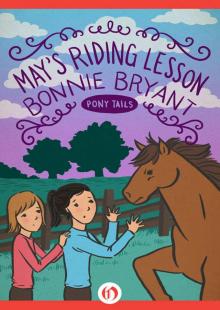 Pony Tails 02- May's Riding Lesson
Pony Tails 02- May's Riding Lesson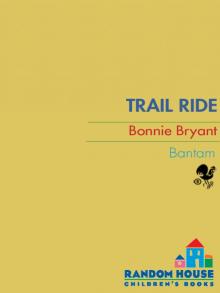 Trail Ride
Trail Ride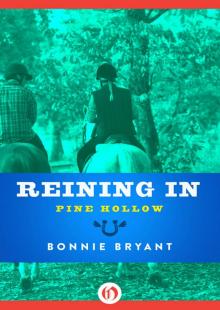 Reining In
Reining In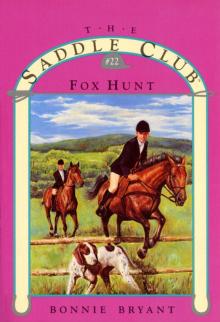 The Fox Hunt
The Fox Hunt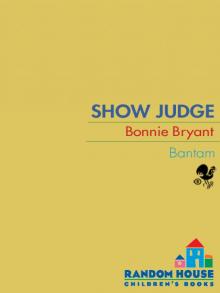 Show Judge
Show Judge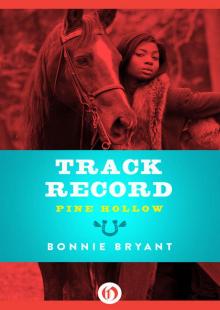 Track Record
Track Record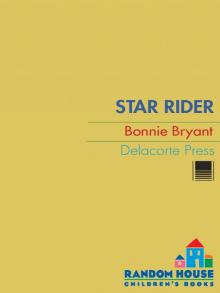 Star Rider
Star Rider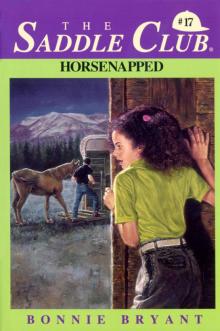 Horsenapped!
Horsenapped!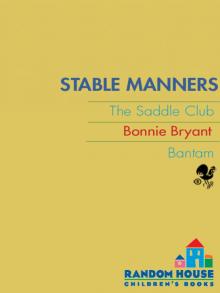 Stable Manners
Stable Manners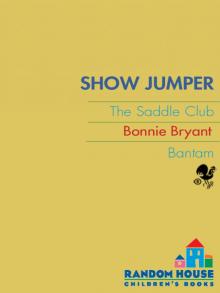 Show Jumper
Show Jumper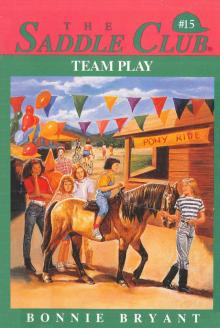 Team Play
Team Play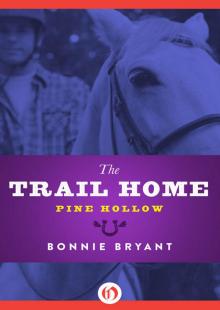 The Trail Home
The Trail Home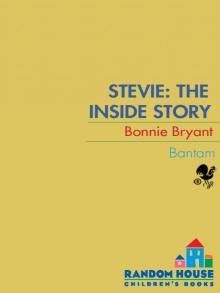 Stevie
Stevie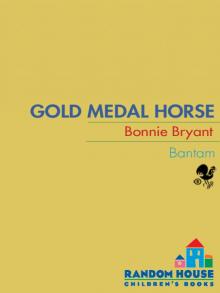 Gold Medal Horse
Gold Medal Horse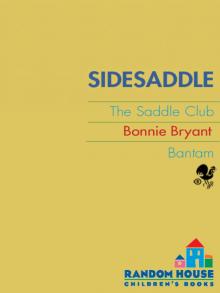 Sidesaddle
Sidesaddle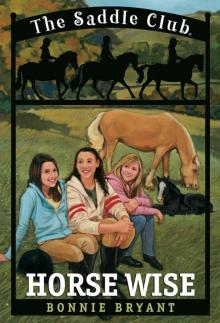 Horse Wise
Horse Wise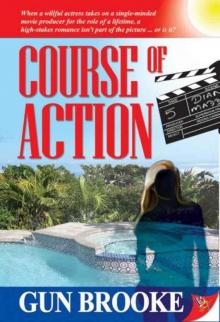 Course of Action
Course of Action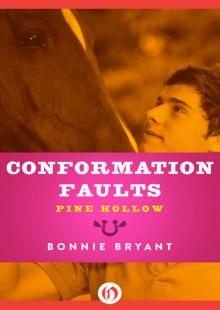 Conformation Faults
Conformation Faults